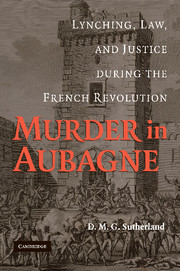
-
Select format
-
- Publisher:
- Cambridge University Press
- Publication date:
- 13 August 2009
- 20 April 2009
- ISBN:
- 9780511576379
- 9780521883047
- 9781107404281
- Dimensions:
- (228 x 152 mm)
- Weight & Pages:
- 0.57kg, 336 Pages
- Dimensions:
- (229 x 152 mm)
- Weight & Pages:
- 0.5kg, 336 Pages
You may already have access via personal or institutional login
Book description
This book is a study of faction, lynching, murder, terror and counter-terror during the French Revolution. It examines factionalism in small towns like Aubagne near Marseille, and how this produced the murders and prison massacres of 1795–8. Another major theme is the convergence of lynching from below with official terror from above. Although the terror may have been designed to solve a national emergency in the spring of 1793, in southern France it permitted one faction to continue a struggle against its enemies, a struggle that had begun earlier over local issues like taxation and governance. It uses the techniques of micro-history to tell the story of the small town of Aubagne. It then extends the scope to places nearby like Marseille, Arles, and Aix-en-Provence. Along the way, it illuminates familiar topics like the activity of clubs and revolutionary tribunals and then explores largely unexamined areas like lynching, the sociology of faction, the emergence of theories of violent fraternal democracy, and the nature of the White Terror.
Reviews
"One of the world's leading historians of the French Revolution has written a detailed, original and convincing picture of what living through the Revolution meant for ordinary people in a distinctive region of France. It will be widely hailed among students of the period as a remarkable addition to our knowledge and understanding of the complex and violent repercussions of the Terror." -William Doyle, University of Bristol
"Through meticulous historical research, Donald Sutherland has succeeded in reconstructing the tensions, divisions and passions which threw a southern French town into a horrific cycle of blood during the French Revolution. Murder in Aubagneilluminates the Revolution at ground level in a way that few other books have done."David A. Bell, Johns Hopkins University
"Donald Sutherland writes a fascinating study of revolution and violence as it was experienced in one community in Provence: of the complex interactions between local, regional, and national history; of the convergence of revolutionary strategies from above with vendetta, vigilantism, and factional hatreds from below. Though not all historians will agree with all of the book’s more provocative conclusions, it is a masterful study that must be read by anyone interested in understanding the complex and dramatic history of the French Revolution."Timothy Tackett, University of California Irvine, author of Religion, Revolution, and Regional Culture, Becoming a Revolutionary and When the King Took Flight
"Recommended." -Choice
"...an impressive research feat." -Anthony Crubaugh, H-France
"...exemplary, fascinating, and important..." -Edward J. Woell, H-France
"...a book that cannot be ignored, especially by historians of the Revolution in the provinces." -Alan Forrest, H-France
"Donald Sutherland is well qualified to provide a widely researched and closely argued study of the interplay of local, regional, and national interestes in the case of a single town...during the French Revolution." -Christopher English, Canadian Journal of History
"Sutherland skillfully demonstrates that the roots of this violence had as much to do with the local culture and social context as it did with any national trends." -Eric F. Johnson, Eighteenth-Century Studies
Contents
Metrics
Altmetric attention score
Full text views
Full text views help Loading metrics...
Loading metrics...
* Views captured on Cambridge Core between #date#. This data will be updated every 24 hours.
Usage data cannot currently be displayed.
Accessibility standard: Unknown
Why this information is here
This section outlines the accessibility features of this content - including support for screen readers, full keyboard navigation and high-contrast display options. This may not be relevant for you.
Accessibility Information
Accessibility compliance for the PDF of this book is currently unknown and may be updated in the future.


